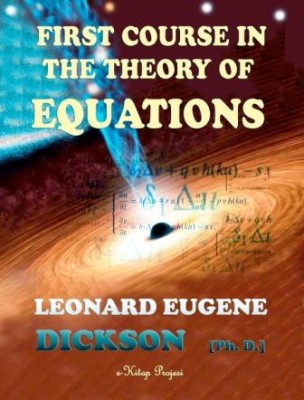More Search Results...
Leonard Eugene Dickson (1874 – 1954) was an American mathematician. He was one of the first American researchers in abstract algebra, in particular the theory of finite fields and classical groups, and is also remembered for a three-volume history of number theory, History of the Theory of Numbers.
Dickson considered himself a Texan by virtue of having grown up in Cleburne, where his father was a banker, merchant, and real estate investor. He attended the University of Texas at Austin, where George Bruce Halsted encouraged his study of mathematics. Dickson earned a B.S. in 1893 and an M.S. in 1894, under Halsted’s supervision. Dickson first specialised in Halsted’s own specialty, geometry.
Both the University of Chicago and Harvard University welcomed Dickson as a Ph.D. student, and Dickson initially accepted Harvard’s offer, but chose to attend Chicago instead. In 1896, when he was only 22 years of age, he was awarded Chicago’s first doctorate in mathematics, for a dissertation titled The Analytic Representation of Substitutions on a Power of a Prime Number of Letters with a Discussion of the Linear Group, supervised by E. H. Moore.
Dickson then went to Leipzig and Paris to study under Sophus Lie and Camille Jordan, respectively. On returning to the USA, he became an instructor at the University of California. In 1899 and at the extraordinarily young age of 25, Dickson was appointed associate professor at the University of Texas. Chicago countered by offering him a position in 1900, and he spent the balance of his career there. At Chicago, he supervised 53 Ph.D. theses; his most accomplished student was probably A. A. Albert.
He was a visiting professor at the University of California in 1914, 1918, and 1922. In 1939, he returned to Texas to retire.
Dickson was elected to the National Academy of Sciences in 1913, and was also a member of the American Philosophical Society, the American Academy of Arts and Sciences, the London Mathematical Society, the French Academy of Sciences and the Union of Czech Mathematicians and Physicists. Dickson was the first recipient of a prize created in 1924 by The American Association for the Advancement of Science, for his work on the arithmetics of algebras. Harvard (1936) and Princeton (1941) awarded him honorary doctorates.
First Course in the Theory of Equations
The theory of equations is not only a necessity in the subsequent mathematical courses and their applications, but furnishes an illuminating sequel to geometry, algebra and analytic geometry. Moreover, it develops anew and in greater detail various fundamental ideas of calculus for the simple, but important, case of polynomials. The theory of equations therefore affords a useful supplement to differential calculus whether taken subsequently or simultaneously.
It was to meet the numerous needs of the student in regard to his earlier and future mathematical courses that the present book was planned with great care and after wide consultation. It differs essentially from the author’s Elementary Theory of Equations, both in regard to omissions and additions, and since it is addressed to younger students and may be used parallel with a course in differential calculus. Simpler and more detailed proofs are now employed. The exercises are simpler, more numerous, of greater variety, and involve more practical applications.
More info →




























